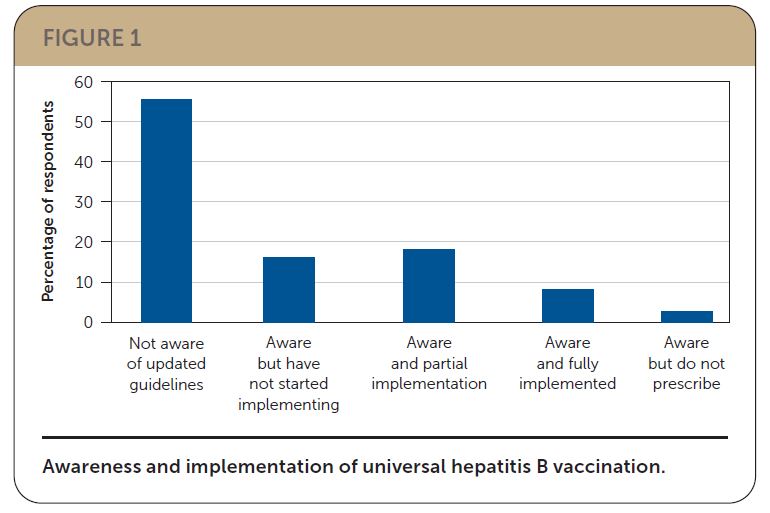Increased Physician Awareness Is Needed to Implement Universal Hepatitis B Vaccination
One Pagers | July 21, 2022
Rita K. Kuwahara, MD, MIH; Yalda Jabbarpour, MD; John M. Westfall, MD, MPH
To counter a rising incidence of acute hepatitis B, the Advisory Committee on Immunization Practices (ACIP) now recommends universal hepatitis B vaccination for adults 19 to 59 years of age. A national survey found that most family physicians are not aware of or have not fully implemented this recommendation. Targeted efforts by training institutions, medical systems, and physician organizations will be instrumental in raising awareness and curbing preventable disease.

It is estimated that up to 2.4 million people in the United States are living with chronic hepatitis B.1 The opioid epidemic has contributed to a rise in acute hepatitis B, with 36% of infections associated with injection drug use in 2018.2 Low adult hepatitis B vaccination rates have fueled significant increases in acute hepatitis B incidence in states most affected by the opioid epidemic such as Maine, Kentucky, West Virginia, and Tennessee.3,4 Only 30% of the U.S. adult population is vaccinated against hepatitis B.5
In November 2021, the ACIP updated its hepatitis B vaccine recommendation, expanding the eligible population.6 Instead of selective vaccination based on risk factor assessment, the ACIP recommends universal hepatitis B vaccination for adults 19 to 59 years of age. The ACIP also continues to recommend vaccinating adults 60 years and older with risk factors for hepatitis B and states that adults 60 years and older without known risk factors may be vaccinated.
One of the challenges with implementing new clinical guidelines into practice is building awareness of updated recommendations among primary care clinicians. To assess awareness of the new recommendations, a survey was randomly distributed to 927 family physicians via email using the American Academy of Family Physicians’ (AAFP) survey platform in February 2022. This survey had multiple questions gauging knowledge and attitudes toward vaccination in general and included a question specifically about the hepatitis B vaccine recommendations. Respondents were asked if they were currently routinely implementing the updated guidelines for universal adult hepatitis B vaccination for adults 19 to 59 years of age and risk-based hepatitis B vaccination for adults 60 years and older in their daily practice.
A total of 265 family physicians answered the survey (Figure 1). Of those respondents, 55% (n = 145) stated that they were not aware of the updated guidelines. Only 8% (n = 22) of respondents had fully implemented the guidelines in daily practice. Results did not vary substantially based on sex, MD/DO degree, international medical graduate status, or years since residency.
Although this survey is not representative of all family physicians, it suggests that overall awareness of the new ACIP guidelines may be low, and efforts must be made to improve clinician awareness. Because primary care physicians provide most of the adult vaccinations in the United States, their leadership is essential to vaccinate adults 19 to 59 years of age against hepatitis B to prevent further increase in new infections.7 Targeted efforts by training institutions, medical systems, and physician organizations such as the AAFP and the American College of Physicians will be instrumental in raising awareness and curbing preventable disease.
REFERENCES
- Hepatitis B Foundation. Hepatitis B facts and figures. Accessed June 2, 2022. https://www.hepb.org/ what-is-hepatitis-b/what-is-hepb/facts-and-figures
- Centers for Disease Control and Prevention. Viral hepatitis surveillance report 2018–hepatitis B. November 19, 2020. Accessed June 2, 2022. https://www.cdc.gov/hepatitis/ statistics/2018surveillance/HepB.htm
- Public Consulting Group, Inc. Vulnerability assessment for opioid overdoses and bloodborne infections associated with non-sterile injection drug use in Maine. July 2019. Accessed June 2, 2022. https://www.maine.gov/dhhs/ mecdc/navtabs/documents/Maine-CDC-Vulnerabilty- Assessment-Report.pdf
- Harris AM, Iqbal K, Schillie S, et al. Increases in acute hepatitis B virus infections–Kentucky, Tennessee, and West Virginia, 2006-2013. MMWR Morb Mortal Wkly Rep. 2016; 65(3):47-50.
- Centers for Disease Control and Prevention. ACIP evidence to recommendations for a universal hepatitis B (HepB) vaccination strategy in adults. March 30, 2022. Accessed June 2, 2022. https://www.cdc.gov/vaccines/ acip/recs/grade/hepb-adults-etr.html
- Weng MK, Doshani M, Khan MA, et al. Universal hepatitis B vaccination in adults aged 19-59 years: updated recommendations of the Advisory Committee on Immunization Practices–United States, 2022. MMWR Morb Mortal Wkly Rep. 2022;71(13):477-483.
- Wilkinson E, Jetty A, Petterson S, et al. Primary care’s historic role in vaccination and potential role in COVID-19 immunization programs. Ann Fam Med. 2021;19(4):351-355.
The information and opinions contained in research from the Graham Center do not necessarily reflect the views or the policy of the AAFP.
This series is coordinated by Kenny Lin, MD, MPH, deputy editor.
A collection of Graham Center Policy One-Pagers published in AFP is available at https://www.aafp.org/afp/graham. One-Pagers are also available at https://www.graham-center.org.
Author disclosure: No relevant financial relationships.